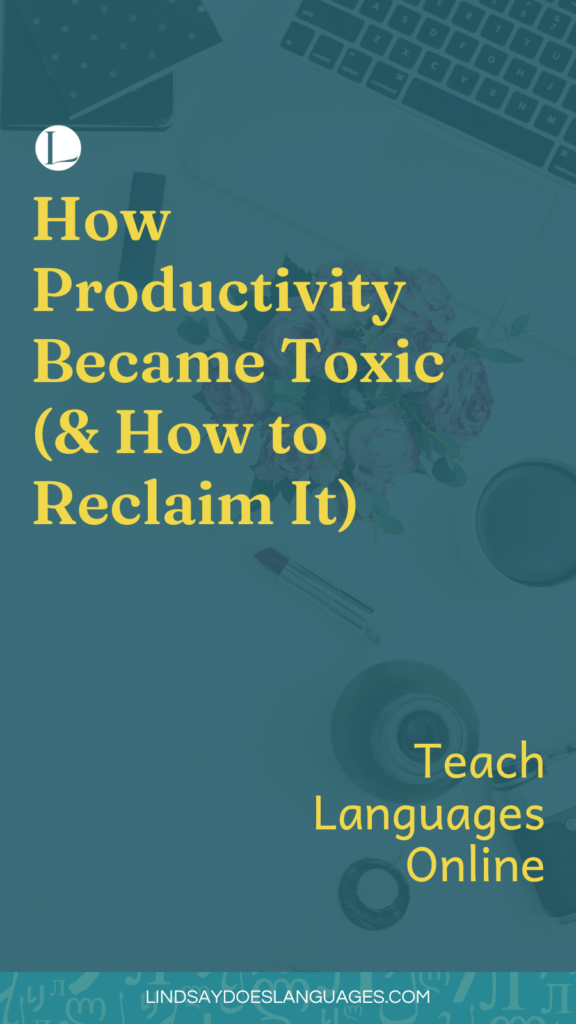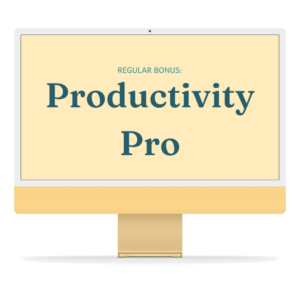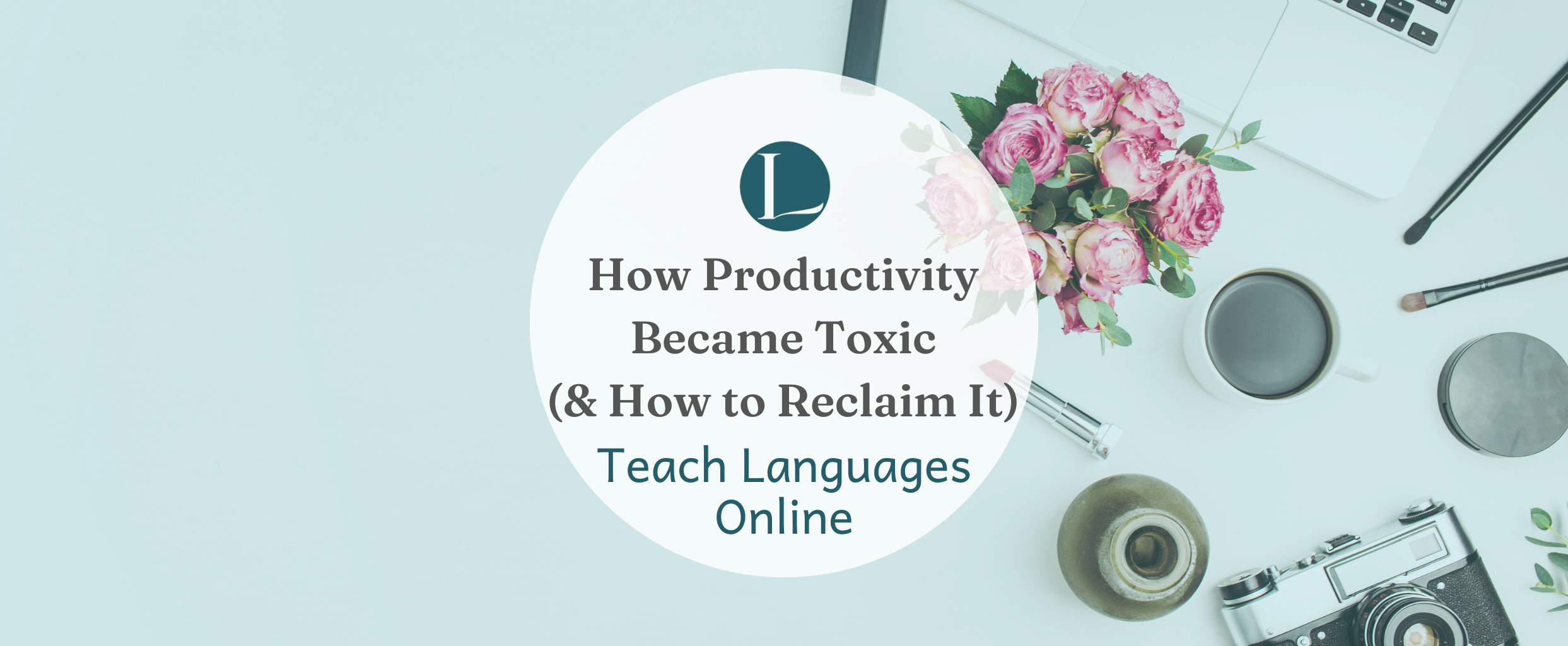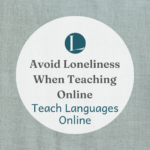Blog Podcast Teach Languages Online
September 13th, 2023
How Productivity Became Toxic in Hustle Culture (& How to Reclaim It For Yourself)
There’s no denying that being mindful of how we spend our time has many benefits. We get more of the work we want done, we can then spend more of our time on the things we want to for leisure, we’re overall more likely to feel calmer and more content.
However, you may wonder how productivity became toxic in hustle culture. We’ll discuss that here as well as how to reclaim positive productivity for yourself.

Enjoy Teach Languages Online Your Way
The Video
The Podcast
How Productivity Became Toxic in Hustle Culture
We’ve achieved a lot as humans. And it seems to me that we’re always feeling ambitious to achieve more. Harder, better, faster, stronger, right?
The common interpretation of that when it comes to work is to work more hours, get more done, earn more money, teach more people.
And to an extent, that’s great.
However, when it becomes the sole focus and motivator, it’s unlikely to lead to that calm contentedness that productivity is capable of.
How did we get here?
There’s a few reasons that come to mind.
Firstly, the unavoidable presence of work. Gone are the days when we finish work for the day and that’s it until tomorrow.
With email at home on our laptops and worse of all phones, it’s far too easy to fall into the trap of being always on, or at the very least, always on standby.
Secondly, there’s a small number of people who probably have achieved the ‘more, more, more’ growth we have placed value on with overwork. When asked about this, the answers typically include productivity somewhere in the mix.
If you’re in the UK, perhaps you’re familiar with the accusations of ‘toxic productivity’ and ‘hustle culture’ that faced Molly-Mae from Love Island after her interview on The Diary of a CEO podcast.
Claiming that we ‘all have the same 24 hours in the day as Beyoncé’ comes across slightly ignorant of individual circumstances.
Finally, it is that comparison that we think comes from the Molly-Maes of the world, aka ‘influencers’, but actually can come from anyone we know (or don’t know) doing anything we see online that we haven’t done.
That comparison can lead to us feeling that we’re not working hard enough because if we were, these things would have happened to us too.
And so, productivity becomes toxic productivity as we’re led to believe that the answer is more work, more hustle, and more productivity.
Why the answer isn’t always more
Don’t get me wrong. I’m not saying that business growth is a bad thing or something that shouldn’t be aimed for.
But what I am saying is that it isn’t always the right direction for everyone.
There’s nothing wrong with building your business to a point you’re content with that gives you enough of what you’re after – enough money, enough students, enough time for yourself.
If you get to that point and you’re satisfied, there’s no need to feel pressured into growth that doesn’t suit you. And that doesn’t mean you can’t learn to become more productive!
If you get to that point of enough and want more, then by all means go for it!
However, it’s always worth asking yourself why you think the answer is more.
Is it that you want more for your own personal reasons?
Or is it because you’ve ended up reading a dozen blog articles that told you you need more?
It’s always worth considering your goals for what you’ll do with more, and reasons for wanting more too.
In language learning terms…
Let’s think about this is language learning terms.
When you start a new language and learn just 1 new word, that’s 100% more than you knew yesterday. A big leap! With just one word.
But as you learn more words, and that word count goes up, the percentage of newness goes down and the rate of growth appears to slow even though you’re still learning new words.
That’s not to say that you’re a bad learner, you’re not putting in as much effort or anything like that.
It’s simply the way that it works.
And the same is true for productivity in relation to working hours.
Working more hours doesn’t equate to getting more done.
In my personal experience, when I have one task and a full day to do it, I’ll get it done, but slowly and with some procrastination and distractions along the way.
I certainly won’t be focused on the same task all day as we might hope when we set aside a whole day for one task.
However, if I give myself just a morning, or even just an hour or so to get the same task done, it’ll still get done.
The difference is that I’ll be working more solidly. Less procrastination, less distraction, more focus.
Related: How to Learn a Language When You’re Busy Saying “I Don’t Have Time!”
How to Reclaim Positive Productivity for Yourself
So as we think about reclaiming productivity to be something positive and not something to fear that will lead to stressful hustle and overwhelm, we need to ask ourselves a few questions.
How do we want to spend our free time on Earth?
I know, right. In with the big guns.
But we have to start here to make the rest of our answers and decisions mean something valuable to us.
Work is never just about earning more money or gaining more free time. It’s about what we want to do with that money and time. That’s the goal, the focus.
The money and time are simply tools that make it possible.
So…don’t be afraid to dream: how do you want to spend your free time on Earth?
What do you enjoy that you want to do more of and how will working more productively help you get to do that?
What tasks need to be prioritised?
As a solo business owner, there’s always going to be more you can do. More promotion, more creation, more work.
One of the biggest skills that will help you stick with your work is knowing when to finish for the day. Knowing what is enough.
It helps to prioritise your tasks. Because to be honest, the least important ones can often be the most fun! So it can be easy to procrastinate from more important prioritised tasks that will have a bigger impact by ‘playing’ with smaller tasks that aren’t likely to be as impactful.
We talk a lot more about how to prioritise in Productivity Pro, which you get exclusively as a member of the Online Teaching Starter Kit.
What are my boundaries between work & overwork?
Similarly to considering priorities, you’ll sometimes start a day with the perfect length to do list. Everything gets done. It all just fits in.
And then other days, not so much! Perhaps your mood is different, maybe the weather is hotter and more uncomfortable, or perhaps you added to much to the list. For whatever reason, there’ll be days when you don’t get everything done you expected.
This is ok!
The point of getting better at productivity isn’t to become a robot that does the same exact amount of work day in and day out.
It’s instead, in part, about being able to identify your boundaries between a comfortable amount of work and overwork.
This could be about setting working hours, it could be about having a cut off point each day, or a day (or two or three – or more!) each week when you do not work under any circumstance!
What are my boundaries between work & play?
Equally, these boundaries are important between work and play. In other words, work and non-working time.
You’ll likely be thinking about work at times when you’re “not” working. This is normal. It allows you space to percolate on ideas.
I find I dream bigger when away from my desk and not pressured to instantly make a plan to make things happen. Swimming is great for this because you can’t write or have tech in the water!
Even though swimming is all about play and leisure time for me, I do sometimes find my mind drifting to think about work.
This is fine, because it’s a sort of meditative state where my thoughts are allowed to come and go freely. It allows for me to develop ideas and plans pressure free.
Do you need a break?
When you feel overwhelmed and like you’re not doing enough, the thought of taking a break is the last thing on our minds!
However, it can actually be more productive than struggling on through and trying to keep working.
So to avoid productivity slipping into toxic productivity, and work sliding into hustle culture, allow yourself the space and time to take a break when you need to.
You’ll come back more refreshed than if you plow on through.
Join me for Productivity Pro to reclaim productivity!
Ready to learn more and reclaim productivity for yourself?

Inside the Online Teaching Starter Kit on Wednesday 20th September, I’ll be teaching a live and updated Productivity Pro.
This course is available exclusively for OTSK members, along with everything else inside the program.








